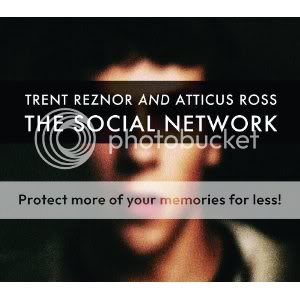The Social Network
Directed by David Fincher
Written by Aaron Sorkin
Sony, October 1, 2010
Trent Reznor and Atticus Ross
The Social Network
The Null Corporation, September 28, 2010
Buy it (or download a bunch of it for free) from Null
Browsing the web is a mostly silent affair. Isn’t it odd, then, that a movie about the web sounds so wonderful? The most memorable scene in David Fincher’s The Social Network isn’t memorable for how it’s shot or cut, but for how it’s recorded: Justin Timberlake’s Sean Parker regaling Jesse Eisenberg’s Mark Zuckerberg with a vision of capitalistic creativity as an endless series of scores to settle and people to impress, barely audible over the insistent thump and roar of a nightclub soundsystem. To even hear what they were saying, you had to strain; I found myself leaning forward in my chair the way I would if I were in a similar real-world situation, despite the fact that what I was trying to hear wasn’t coming out of someone’s mouth a couple feet in front of me but out of surround-sound speakers all around the theater.
And throughout the film, the movie really comes to life when the score from Nine Inch Nails’ Trent Reznor and Atticus Ross is cued up–pulsing, humming, twitching, ominous, and so prominent in the mix that it’s almost like listening to some invisible robot’s dialogue intertwined with that of the characters we can see. It gives an all-night drunken coding binge the anger and energy of a well-executed assassination (“In Motion,” “A Familiar Taste”), and punctuates a jilted nerd’s lonely walk across a wintry campus with a jet-black thrumming that wouldn’t sound out of place being emitted by Leviathan from Hellbound: Hellraiser II (“Hand Covers Bruise”). Like that nightclub pounding, it’s a presence that’s impossible to ignore, altering and obscuring the stakes and emotions of the nominal scene at hand–like the class-conscious “speaking in code” that puts an end to Zuckerberg’s relationship with Rooney Mara’s Erica Albright in the very first scene, and like the fine print that Andrew Garfield’s Eduardo Saverin ignores to his peril much later on, it’s a truth you need focus on even when your instincts tell you otherwise. It even suggests, through the incorporation of chiptunes (“In Motion,” “Intriguing Possibilities,” “Pieces Form the Whole”), Erica’s kiss-off to Zuckerberg when he confronts her after his creation starts taking off: “Good luck with your videogame.” Boys and their toys.
There’s the crux of the movie right there. Much has been made of the women in this movie, or the lack thereof, and in part rightfully so: Once you’ve learned the Bechdel Test you can’t unlearn it, and it gets increasingly frustrating to watch movies not set in a monastery or prison that don’t have two female characters to rub together. But contra this rather ridiculous Jezebel piece by Irin Carmon and its conflation of the presence of misogyny in a film with misogyny on the part of the filmgoers, I think I understand, and appreciate, what Fincher and writer Aaron Sorkin have done in this war movie about the battle of the sexes. And again I have Reznor and Ross’s work to thank, specifically the sequence where a busload of girls pulls up to a swanky final club for sexytimes with the smart and wealthy. Attempting to pull Ivy League tail to the tune of Trent Reznor? I’ve been there, precisely for the reasons that the film version of Zuckerberg went there: to fill an endless cavern of insecurity, built up over a decade and a half of being the smartest kid in the room, with all the pitfalls and privileges that afforded me. To show that I’m in charge, I’m cool, I’m elite, I’m worthwhile–not the blond jock-gods, but the geek. The women we see in most of The Social Network, the status-hungry sex objects, the fetishized Asians and Californians, those are the women that young smart men who have been turned/turned themselves into young smart creeps see. It’s no coincidence that the film begins and ends with two conversations in which two women of a very different sort than that getting Zuckerberg’s number to the nth decimal. One calls him on being a dick; the other calls him on the fact that, somewhere inside, he knows better than to be one.


2 Responses to Music Time/Movie Time: The Social Network